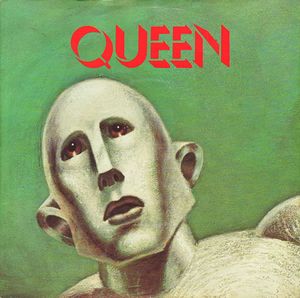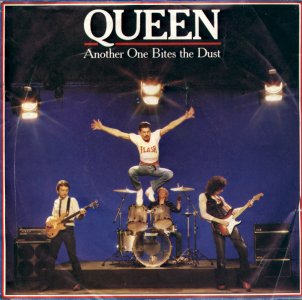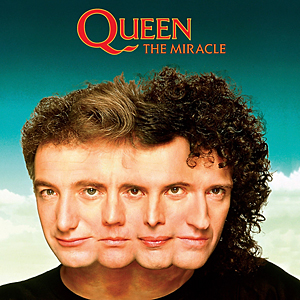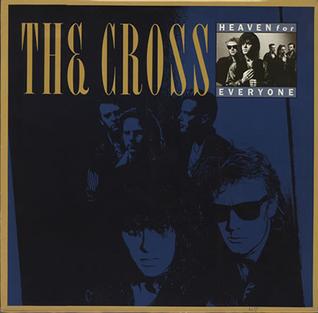
"We Are the Champions" is a song by the British rock band Queen, released from the band's sixth album News of the World (1977). Written by lead singer Freddie Mercury, it remains among rock's most recognisable anthems. The song was a worldwide success, reaching number two in the UK Singles Chart, number four on the Billboard Hot 100 in the US, number three in Canada and the top ten in many other countries. In 2009 it was inducted into the Grammy Hall of Fame and was voted the world's favourite song in a 2005 Sony Ericsson world music poll.

Duran Duran are an English new wave band formed in Birmingham in 1978 by singer and bassist Stephen Duffy, keyboardist Nick Rhodes and guitarist/bassist John Taylor. With the addition of drummer Roger Taylor the following year, the band went through numerous personnel changes before May 1980, when they settled on their most famous line-up by adding guitarist Andy Taylor and lead vocalist Simon Le Bon.

Roger Meddows Taylor is an English musician, songwriter and singer. He achieved international fame as the drummer for the rock band Queen. As a drummer, Taylor was recognised early in his career for his unique sound and was voted the eighth-greatest drummer in classic rock music history in a listener poll conducted by Planet Rock in 2005. He was inducted into the Rock and Roll Hall of Fame in 2001 as a member of Queen.

"Another One Bites the Dust" is a song by the British rock band Queen. Written by bassist John Deacon, the song was featured on the group's eighth studio album The Game (1980). It was a worldwide hit, charting at number one on the US Billboard Hot 100 for three weeks, from 4 October to 18 October. The song spent 15 weeks in the Billboard top 10, including 13 weeks in the top five, and 31 weeks total on the chart. It reached number two on the Hot Soul Singles chart and the Disco Top 100 chart, and number seven on the UK Singles Chart. The song is credited as Queen's best-selling single, with sales of over 7 million copies. This version was ranked at number 34 on Billboard's All-Time Top Songs.

"Crazy Little Thing Called Love" is a song by the British rock band Queen. Written by Freddie Mercury in 1979, the track is included on their 1980 album The Game, and also appears on the band's compilation album Greatest Hits in 1981. The song peaked at number two in the UK Singles Chart in 1979, becoming the group's first number-one single on the Billboard Hot 100 in the US in 1980, remaining there for four consecutive weeks. It topped the Australian ARIA Charts for seven weeks. It was the band's final single release of the 1970s.

"Tie Your Mother Down" is a song by the British rock band Queen, written by lead guitarist Brian May. It is the opening track and the second single from their 1976 album A Day at the Races. On its original release as a single in 1977 the song peaked at 31 in the UK Singles Chart. More than 20 years later, it was released as a double a-side to "No-One but You " where it reached 13 in UK Singles Chart. On the album the song is preceded by a one-minute instrumental intro featuring a Shepard tone melody, performed by Brian May, which is reprised in the ending of "Teo Torriatte": this was intended to create a "circle" within the album.

The Miracle is the thirteenth studio album by the British rock band Queen, released on 22 May 1989 by Parlophone Records and Capitol Records in both the United Kingdom and the U.S. respectively, where it was the band's only studio album to be released on latter label. The album was recorded as the band recovered from Brian May's marital problems and Freddie Mercury's HIV diagnosis in 1987. Recording started in January 1988 and lasted for an entire year. The album was originally going to be called The Invisible Men, but three weeks before the release, according to Roger Taylor, they changed the name to The Miracle. It was also the last Queen album with a photo of the band on the front cover.

"You've Got a Friend" is a 1971 song written by American singer-songwriter Carole King. It was first recorded by King and included on her second studio album, Tapestry (1971). Another well-known version is by James Taylor from his album Mud Slide Slim and the Blue Horizon. His was released as a single in 1971, reaching number one on the Billboard Hot 100 and number four on the UK Singles Chart. The two versions were recorded simultaneously in 1971 with shared musicians.

"Another Brick in the Wall" is a three-part composition on Pink Floyd's 1979 rock opera The Wall, written by bassist Roger Waters. "Part 2", a protest song against corporal punishment and rigid and abusive schooling, features a children's choir. At the suggestion of producer Bob Ezrin, Pink Floyd added elements of disco.

"Crazy Train" is the debut solo single by English heavy metal vocalist Ozzy Osbourne and was released in 1980 from his debut album as a solo artist, Blizzard of Ozz (1980). The song was written by Osbourne, Randy Rhoads, and Bob Daisley. The lyrics deal with the subject of the Cold War and the fear of annihilation that existed during this period.

"These Are the Days of Our Lives" is a song by the British rock band Queen. Although credited to the whole band, it was largely written by their drummer Roger Taylor, and is the eighth track on the band's 1991 album Innuendo.

"Flash" is a song by British rock band Queen. Written by guitarist Brian May, "Flash" is the theme song of the 1980 film Flash Gordon.

"Innuendo" is a song by the British rock band Queen. Written by Freddie Mercury and Roger Taylor but credited to Queen, it is the opening track on the album of the same name (1991), and was released as the first single from the album. The single debuted at number one on the UK Singles Chart in January 1991, the band's first number-one hit since "Under Pressure" in 1981, and additionally reached the top ten in ten other countries. It is included on the band's second compilation album Greatest Hits II. It was described as "the band's first complex work released after the 1970s".

"Save a Prayer" is the sixth single by the English new wave band Duran Duran, released on 9 August 1982. The song was the third single taken from their second album Rio (1982). It became Duran Duran's biggest hit on the UK Singles Chart, reaching number two. As of October 2021 "Save a Prayer" is the sixth most streamed Duran Duran song in the UK.

"No-One But You " is the final single recorded by the British rock band Queen. Recorded and released in 1997, six years after the death of lead singer Freddie Mercury, it is the only Queen recording to feature a three-piece lineup: guitarist Brian May, drummer Roger Taylor, and bassist John Deacon. May and Taylor share lead vocals. The song was released on the album Queen Rocks and it was also released as a double a-side single with "Tie Your Mother Down". It was later included on the compilation album Greatest Hits III.

"Somebody to Love" is a song by the British rock band Queen, written by the lead singer/pianist Freddie Mercury. It debuted on the band's 1976 album A Day at the Races and also appears on their 1981 compilation album Greatest Hits.

"Heaven for Everyone" is a song written by Queen drummer Roger Taylor. It originally appeared on his side project the Cross's album Shove It, with Freddie Mercury as a guest vocalist, and it is the album's fourth track. It was reworked with Queen's music and appeared in the 1995 album Made in Heaven where it was the seventh track, and was released as the first single – four years after Mercury's death. Queen's version reached number two on the UK Singles Chart while peaking at number one in Hungary and becoming a top-ten hit in several other European nations. In 1999 it was included in Queen’s compilation album Greatest Hits III.

"The Invisible Man" is a song by the British rock band Queen, written by drummer Roger Taylor but credited to Queen. The song is sung mostly by Freddie Mercury, with vocal contributions from Taylor. The song was released in August 1989 as the third single from the bands album The Miracle. Taylor claims that he got the inspiration to create the song while reading a book, and the bassline instantly came to his imagination. The song title was inspired by the H. G. Wells novel of the same name.

"The Miracle" is the fifth and final single from Queen's 1989 studio album of the same name. It was composed by the entire band, though Freddie Mercury and John Deacon were the main writers. It was released as a single on 27 November 1989 and it was the band's final single release of the 1980s.

Fun in Space is the debut solo album by English musician Roger Taylor, the drummer of Queen. It was released on 6 April 1981 in the UK and 9 May in the US. The album peaked at number 18 in the British charts, while it performed poorly in the US.




















